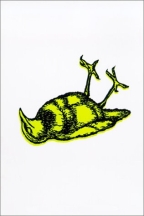William Burroughs, the source of more than a few famous quotes,
once said, 'Language is a virus from outer space'. In 'Lullaby',
Chuck Palahniuk takes that concept to its logical conclusion in a
number of fashions. His plot concerns a linguistic virus, a death
spell. It doesn't stop there. The language of the novel itself is
viral, consisting of repetitive rhythms that are pounded into the
readers' brains. It's positively rattling with ideas. Aphorisms
litter its killing floor, and be advised there's lots of killing. The
characters exist in language, not just in fleshy bodies, but be
advised there's fair amount of flesh. 'Lullaby' uses all the tools of
the supernatural horror novel, but it dissects a different corpse. In
additional to the usual victims of the fluffy, friendly horror brick
-- families -- you'll find culture, advertising, New Age bullshit and
the oppressive presence of government control (without government, or
actually control). Palahniuk shows a complete and very blunt control
over every aspect of the language of horror. He uses the bat to
bloody a different set of targets. If you can take it -- and some
will not be able to -- you'll soon realize that you're in the
presence of a viciously skillful writer.
In 'Lullaby', Palahniuk tells the story -- just the facts, ma'am
-- of Carl Streator, a reporter who stumbles onto a story that
reveals the power of language. Streator isn't a particularly likable
guy, but he's not repulsive. He's maybe a bit tightly wound, a little
overly dispassionate. But then, that's certainly understandable when
his subject is SIDS, Sudden Infant Death Syndrome. Assigned by his
editor to do a series on "the type of story that every parent and
grandparent is too afraid to read and too afraid not to read", he
finds a pattern where none has been seen before. After all, he's a
details guy. A reporter. The deal is, is that there's a book, a
collection titled "Poems and Songs from Around the World", and at
each SIDS site he investigates, that book is open to page 27, an
African "culling song". Once you've seen the song, once you've spoken
the song, you can kill with it -- even by thinking it in someone's
general direction. Streator finds that he has become a serial killer.
Ordinary thoughts that usually are easily ignored become lethal
weapons.
Investigating the deaths, he finds himself allied with Helen
Boyle, a real estate broker who specializes in haunted houses, her
secretary Mona Sabbat, and Mona's larcenous boyfriend Oyster. They
set out on a quest together, the new "nuclear family" on a road trip
across the new United States. Palahniuk the writer is hunting big
game in 'Lullaby', not just the usual set of temporal thrills and
chills. Interestingly enough, he provides plenty of the latter while
lambasting the need for them, the use of them to anaesthetize a
populace that needs no Big Brother to watch it. Big ideas are dropped
in without any decoration. They're shaken about by Palahniuk's
percussive language and hurled at the reader like a series of bricks
from a particularly vicious brick-flinging machine. Palahniuk doesn't
want to waste any of his characters' time or any of his readers'
time. The writer has clearly spent his time wisely as well, breaking
down the facts (He's reporter, remember? That important!) into the
densest possible word clusters and repeating them often enough so
that nobody can miss his messages.
There are quite a few of them battered about in 'Lullaby'. But
Palahniuk doesn't dispense with his characters in the face of his
linguistic virtuosity. He treats them harshly but with more than a
little tenderness. Beneath the facts, ma'am, there's an abyss of
longing and loss that he evokes with surprising ease. Every little
regret, every little pleasure is teased about and circumscribed by
language.
Readers of typical thriller and horror novels will find this novel
compulsively readable and probably drier than they might wish, given
the clarity of Palahniuk's grasp. Readers of literary fiction might
find it grimmer and more evil than they would prefer. There's a
flatness of affect that's fitting for a tale told by a serial killer,
even one as reluctant as Carl Streator. Palahniuk's not playing this
game for anyone's satisfaction but his own. If you've ever wanted to
see a writer wield his words as if they were weapons then 'Lullaby'
might be the book you're looking for. 'Lullaby' is a crafty and
clever incantation in which sharp words do the work of blunt
instruments.
